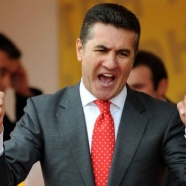 January
23
January
23
All Politics is Local, 2014: Mustafa Sarıgül and the CHP
Sırrı Süreyya Önder[1]
To many of its detractors, the Justice and Development Party (AKP) has been rotten from the start: it is a party that marries Islamic cultural politics with pro-business economic policies. From its privatizations of state companies to its alcohol regulations, from its urban renewal programs that uproot communities to its persistent rent seeking, from its divisive language to its contempt for the environment—all these failings were baked in from the start. As local elections approach and the AKP finds itself more politically weak than at any time in its past eleven years in power, there seems to be a chance that it can be beaten. For better and worse, Mustafa Sarıgül, the mayor of Istanbul’s Şişli municipality, is the vessel for such hopes.
But who is Mustafa Sarıgül, the man who hopes to run the eighth largest city in the world?[2] Does he represent a clear alternative to the AKP—or, more importantly, a better one? To listen to his speeches or read his recent campaign autobiography would give few clues. If anything, one comes away feeling that the man has no political beliefs at all; as his critics suggest, he appears to be a power-loving cypher. But the reality is that Sarıgül has spent over thirty years in Turkish politics—a time period that has included extreme political violence, massive economic reforms, a military coup, civil war in the southeast, economic crisis, and the rise of an Islamic political movement. In navigating such events he has made choices and, whether or not those amount to anything approaching an “ideology,” they certainly suggest the sort of mayor he might be, and what the future might hold for Turkish politics.
CONTENTS
I. An Erzincan Boy in Istanbul
II. Cracks in the CHP and in Turkey
III. How to Get Ahead During a Coup
IV. Turkey’s Youngest Member of Parliament
V. How to Get Ahead in Şişli Politics
VI. Congress and Discord: Trying to Get Ahead in the CHP
VII. Conclusion
I
Sarıgül moved with his family to Şişli when he was only eight years old. Until then, he had lived in Güngören, a small village in the province of Erzincan.[3] Describing village life in the early 1960s, Sarıgül paints a fairly idyllic image of a world where simple pleasures, like trips into the countryside, existed beside the absence of chocolate and phone-lines, and where necessities like citrus fruits came at best seasonally. Religion, handed down from elders, formed the background of daily life, but room existed for a diversity of practices; in the village, Sunni Muslims and Alevis lived “side by side, in friendship, like brothers.”[4]
Though he does not say so, it would seem that the Sarıgüls were an important family in the village. His grandfather, nick-named “Open Headed” Süleyman had attended the 1919 Erzurum congress in which Turkish resistance leaders developed their strategy against western invasion. Subsequently, he fought heroically in the War of Independence on the Eastern Front. At war’s end, he continued to serve in the army and actively supported the republican government’s reforms. (His nick-name was a reminder that he had been the “first in the village to toss off his fez during the Hat Revolution,” when the government mandated western forms of dress.[5]) His loyalty to the Republican People’s Party (CHP) continued into the 1950s, even after the party had lost power—and even after “all of the village” had turned to the Democrat Party (DP).
His family’s continuing allegiance to the former ruling party is never really explained; at best, Sarıgül suggests that his grandfather and father loved the party out of respect for its leaders and their role in the revolution. Observers of rural Turkey at the time often concluded that party loyalty of this sort was closely dependent on a family’s concrete ties to the state: when faced with the first fair elections in 1950, well-connected local elites and their dependents stuck with the CHP while those elites hoping to climb the social ladder or pursue long-standing rivalries by other means threw their support to the DP.[6]
Another sign of the family’s status in the village can be seen in the exploits of Sarıgül’s father, Hakkı. The two did not even meet until Sarıgül was six. Up to that time, his father was living in Istanbul, working odd jobs and sending money back home. When his father returned to the village he would hand out sugar and cigarettes. He was among the first to leave the village for the city, part of a growing flow of rural Turks moving into urban areas beginning in the 1950s. Numerous factors spurred this movement, but chief among them were the policies of the DP government during the decade: based on the expectation of continuing American economic assistance, the DP devised grandiose rural development schemes. Villages became connected to the outside world by roads, tractors were introduced, and taxes on agricultural products were cut. Such policies endeared the party to farmers initially, but created difficulties by the decade’s end. Turkish agriculture did not become more productive, and tractors put seven in eight villagers out of work. Overly ambitious loans left the government in debt and ultimately forced it to devalue the lira in order to secure additional international aid.[7] Feeling the pinch, young village men like Hakkı set out for cities along those newly asphalted roads.
In the cities, a young man like Hakkı would likely have relied on local connections to secure a job. In addition to—or, perhaps, in pursuit of—work, Hakkı was involved in CHP politics. He was among the founders of an İnönü Hearth organization. “Hearths” were essentially clubs where men could mingle around some common cause, in this case support for İsmet İnönü. İnönü had served for years as Mustafa Kemal Ataturk’s prime minister before succeeding him as president. He had guided the country safely through WWII (though creating much social discontent in the progress) and, ultimately, paved the way for a democratic transition in 1950. He had continued to lead his party in opposition for a decade and, after the 1960 military coup, once again led the government as prime minister. In many ways “İsmet Paşa” was the CHP.
By 1966, Hakkı had secured a job as a private chauffer for the owner of knitwear company. Upon his bringing Mustafa and his mother to Istanbul, the owner gave Hakkı a room in his basement and offered Sarıgül’s mother a job cleaning the building. The room lacked even a toilet and the family had to share one with the building’s apartment manager.[8]
The following eight years were a mix of school and work. Though Sarıgül describes himself as a motivated and eager student, he does not say he was a very successful one. In the summers, he would do odd jobs like selling flowers on the street and, later, moving furniture. His mother imagined a career for him in the navy, but his father rejected it, and his future appeared to be headed toward a vocational-technical school after graduation.
The issue of higher education was what first drew Sarıgül into politics. Along with classmates, he participated in protests led by the Progressive Students Union calling on the government to give admissions advantages to students who attended voc-tech schools. His father, who was serving as a CHP delegate by the mid-1970s, however, urged him to devote his time to the CHP’s Youth Arm instead of student politics.
The Youth Arm was the party’s main tool for organizing rallies and mobilizing its supporters. Throughout the CHP’s years in power, this task of connecting with the people had been accomplished through local institutions called “People’s Houses” and “People’s Rooms.” In opposition, the DP had argued that these were merely propaganda tools for the CHP (or, worse, potential sources for Communist infiltration), and following its election, the DP closed them down. In response to these closures, the CHP moved to found the Youth Wing in 1951. By 1954, it had a board of directors—tellingly, two of the eight went on to become head of the party; the Youth Arm was a good platform for a political career.[9]
For a politically active Turkish youth, the 1970s were a frightening and exciting time. The 1961 constitution, written by liberal academics in the wake of the preceding year’s coup, had allowed far greater freedom for political organizations—the result was a marked increase in left-wing parties and associations. On college campuses in particular, students led protests and rallies against American imperialism and for a more just society. Partly reacting to the violent attacks they suffered from more conservative groups and partly on their own initiative, students had begun forming armed groups. To halt this escalation, a military intervention in 1971 had ousted the ineffectual conservative government and replaced it with a more “technocratic” one led by an old ally of İnönü’s. Over the following year, many of the militant leaders had been caught or killed.
Faced with this fragmenting political landscape, CHP leaders attempted to steer a middle course. The results of the first post-coup election in 1961 had demonstrated that the DP (now operating under the name “the Justice Party”) retained its popularity nation-wide: the CHP could not win a majority of the vote. In the 1965 election, hoping to protect itself from the Turkish Workers Party on the left and differentiate itself from the Justice Party on the right, İnönü adopted the slogan “Center Left” to define his party’s stance.[10] The choice proved no more successful and over the following nine years, the party continued to lose elections.
The military intervention of 1971 split the party. The leader of the CHP’s liberal faction, Bülent Ecevit, resigned from his position as Party Secretary and challenged İnönü for the party presidency with the support of many regional party bosses. After thirty-four years of running the party, many party members had come to see the old man as a liability and spoke of the “Paşa Factor” as having a detrimental effect of on the party. In the aftermath of İnönü’s ouster, there was a new excitement surrounding the party.[11] Compared to the aging İnönü, Ecevit was youthful: an excellent writer and brilliant speaker, Ecevit brimmed with promise and energy—an energy which Sarıgül claims to have felt as he began his political career.
II
When Sarıgül joined the CHP, it had just emerged from a successful electoral campaign in 1973. Under Ecevit’s leadership, the party had won a plurality of the vote for the first time in over twenty-five years. In order to form a government, however, it was necessary to form an unwieldy coalition with the leading Islamic party. Though many party members blanched at the notion of bringing an anti-secularist party into the government and, in effect, legitimizing it, other leaders like Deniz Baykal, a leading CHP thinker, argued, “Politics is the art of continuous coalition,” and supported the merger.[12]
It was short-lived. Within ten months the coalition had fallen apart and been replaced by a united front of conservative parties. The loss of power spurred a round of recriminations. Led by Deniz Baykal, a number of party-members began challenging Ecevit’s hold over the party, arguing that he was turning the party into a one-man show similar to İnönü.[13] At the 1975 party congress, they proposed an alternative slate of candidates for the leadership. Though their challenge was easily fended off by Ecevit and his allies, within four years those same allies would be criticizing Ecevit as well.[14]
Histories and memoirs recounting these political squabbles, give little indication of any ideological content—participants emphasize the need for more internal party democracy, but suggest no wider divisions in terms of political belief. It is easy to dismiss party disputes as mere factional power struggles, but they did occur in a larger context of war with Greece, economic crisis, rising American influence, and spiraling violence.[15] Not helping matters, party leaders like Ecevit described their political struggles in rather dire terms. Speaking in front of the Youth Arm in late 1974, for example, Ecevit argued, “In our country, a very dangerous game is being played. Its main target is the CHP. More specifically, its target is the democratic left which sprouted and flowered in the CHP and is now seen taking root in the soil of Turkey.”[16]
Present for such speeches, Sarıgül was becoming an increasingly active member of the Youth Arm. As he recalls, his activities consisted mainly of leading cheers at rallies, signing up friends and acquaintances as party members, and painting slogans like “Populist Ecevit” on buildings during the night. Yet even such simple actions were not without risk in the 1970s: Turkish youths supporting the CHP were squeezed between more extreme peers. During the decade, many young people preferred to join leftist groups like the Revolutionary Youth or rightist ones like the Nationalist Hearths. The areas around university campuses throughout the country were becoming battlegrounds as armed groups fought for control. Politicians would give cover to like-minded extremist groups operating in their areas, allowing them to recruit new members from the sprawling urban slums into which migrants were flocking throughout the decade.[17]
Depending on which party controlled the government, the police would crack down on partisans. Sarıgül was caught painting slogans on two occasions. On the first, the police merely poured his paint over him, ruining his suit. On the second, however, he was taken to the police station in Sirkeci and given a light beating. “The blow,” he remembers, “was a harsh, firm hit . . .My brother and friends weren’t as lucky as me”—they got it worse.[18] Such detentions were short-lived, however, as CHP politicians could dependably be called on to get them out.
Amid the violence and the factional struggles, Sarıgül was becoming acquainted with party leaders. In 1976 he attended a camp for party activists in the southern city of Mersin. Here, future party leaders were given classes in organizing and party doctrine by established party leaders. Among the camp instructors were Ali Topuz, the leader of the CHP’s Istanbul faction, and Abdurrahman Köksaloğlu, the CHP’s Şişli powerbroker. This latter connection would be incredibly important for Sarıgül: a year later, Köksaloğlu nominated him for the presidency of the CHP’s Şişli Youth Arm, thus elevating him to one of the highest unelected positions within the local party.
As a leading party organizer at the local level, Sarıgül was becoming a target for violence. A house he and other party members shared was fired on, and the CHP’s Şişli office was bombed. Sarıgül only avoided the bomb blast because he was in his office at the time and not on the steps where it exploded.
Understandably, from the beginning, his family—his mother in particular—worried about him getting mixed up in such a violent business as politics. Sarıgül reassured her that membership in the Youth Arm would be good, since it opened the door to state jobs. His account of their conversation reveals a lot about what truly mattered in the politics of the 1970s:
My mom, hearing the words “door to the state,” relaxed. Half-heartedly, she said, “Go then.” For one who migrates from the village to the city, state jobs are immensely important . . .If you are a state official, you’re a king. Saying “Door to the state” to my mom had been a fib; finding a job wasn’t so easy. At that time, the mayor of Kağıthane [the municipality that included Şişli until 1984] was Celal Altınay. He put me off for six full months, saying “Today go, tomorrow come” . . .CHP representative Abdurrahman Köksaloğlu entered the fight, picked up the phone and said, “Get this kid a job.” Still nothing . . .I still didn’t get sick of it, I didn’t leave the door. In the end, [Altınay] gave up; I got a job. I was a clerk for Kağıthane municipality. I filled out property and land registrations from neighborhood to neighborhood. After that, I moved to the map office, I mapped the zoning situation . . .Meanwhile I was energetic in the CHP Youth Arm. Daily, as soon as I left work, I was catching my breath in the Şişli Provincial Center. At night we’d put up posters.[19]
Sarıgül learned about local politics in an environment where patronage was of the utmost importance, municipal jobs were tightly bound to political affiliation and internal party disputes could cost one his livelihood. In the 1977 municipal elections, Köksaloğlu and Altınay backed different candidates for mayor.[20] Köksaloğlu’s candidate, Aytekin Kotil, won, but Sarıgül felt it necessary to resign his job in Altınay’s municipality. He was nineteen years old now anyway, and he needed to start thinking about his future more carefully. He did a bit of elementary school teaching and considered going to school in Konya, but Köksaloğlu convinced him to stay in Istanbul and continue his party work.Köksaloğlu liked Sarıgül a great deal—what he liked less was learning that Sarıgül had been conducting a surreptitious relationship with his daughter, Hüyla. By 1979 the relationship had grown more serious and the two felt the time had come to reveal it to Köksaloğlu and ask for his approval of their marriage. This came grudgingly. Some have depicted Sarıgül’s pursuit of Hüyla, a sickly girl with a powerful father, as mere ladder-climbing, but Sarıgül speaks of her fondly even today.[21] Looking back, Sarıgül empathizes with her father: “[Köksaloğlu] was like any girl’s father. He wanted Hüyla to have the best fate in marriage. I was just at the start of my life, very young, my future unclear—moreover broke.”[22]
The newlyweds managed to have a pleasant honeymoon in Romania, before returning once more to Istanbul where Sarıgül continued his mix of party and municipal work. Having backed Istanbul’s current mayor, he had gain a job in the Istanbul Electricity, Tramway, and Tunnel Authority (IETT). One of the city’s, largest bureaucracies, the IETT provided jobs at the time for many up and coming politicians including a young Recep Tayyip Erdoğan.
During 1979, the economy grew worse and worse. By keeping a strong lira, the government kept consumer goods cheap and industrial salaries high, but it came at the cost of ruining the Turkish economy. Foreign investors had no interest in entering the Turkish market, and Turkey increasingly lacked the foreign currency necessary to buy basic commodities. Factory production was running at half capacity or, on occasion, grinding to a halt.[23] The surrounding region too was in a state of chaos. Neighboring Iran had just had a revolution and unrest was growing in its Kurdish regions. Turkish and Iraqi leaders too were becoming nervous about their own Kurdish populations, prompting the head of the army, General Kenan Evren, to fly to Baghdad in April 1979 to discuss strategy.[24] The military sensed the possibility of both ethnic separatism and Islamic revolution.
In January 1980, in order to secure IMF loans, the right-wing government announced a series of reforms devised by the Turkish economist Turgut Özal. These reforms drastically devalued the lira and took steps to open up the Turkish economy. Highly unpopular, these reforms did nothing to calm Turkish politics. Protest continued and violence rose—in the first nine months of 1980, over 1,928 people were killed.[25] Among these was Gün Sazak, a former member of parliament and the deputy leader of the powerful National Action Party. His death set off a spree of retaliatory killings including Sarıgül’s new father-in-law, Abdurrahman Köksaloğlu. On an evening in mid-July, gunmen entered his Şişli tire store and shot him in his office.[26] He died in surgery that night.
Within two months, under the leadership of General Evren, the army staged a coup; parties were closed and leaders were arrested; unions were closed; student radicals were arrested; universities and municipalities were purged; and Turks were confronted with a radically different political reality.
III
All Turks found it necessary to navigate their way through the repression of the coup years. Some were relieved that the military had stepped in; others demoralized. Some challenged the military, others worked with it, and others just tried to keep their head down. Sarıgül seems to have fit this latter category. In the days following the coup, he explains:
Sitting out the first year of the coup in Tokat allowed Sarıgül to avoid the initial rearranging of municipal structures. Upon finishing his service, he returned to Istanbul to pursue private business. His deceased father-in-law had run a tire shop in Şişli and Sarıgül followed suit by opening an auto-garage. While the military busied itself with implementing the Özal economic reforms and drawing up a new constitution—as well as altering numerous social institutions in Turkey ranging from the education system to the labor movement—Sarıgül focused on making money and maintaining his political ties.[28]
When Özal and the military parted ways in 1982, Özal determined to establish his own party and contest the 1983 elections. The party he formed, the Motherland Party (ANAP), was a catchall for the center-right, united largely by its dislike for the military. The twenty-five year old Sarıgül was among the party activists Özal hoped to lure into his coalition.
Özal was a regular customer at Sarıgül’s garage in those early years and one day told him:
“We’re starting a party, come and join Mustafa . . .”
I was surprised; I didn’t want to anger him. “I was in the CHP Youth Arm,” I said, “I’m CHP.”
“It doesn’t matter. There’s CHP among us too,” he replied.
This time I said, “I’m in Aytekin Kotil’s group. If Kotil’s group were for this, I would think about it.”
Looking me up and down he laughed, “Look, look. Your group can come too” . . .
Later, I went and told Aytekin Kotil. He said, “No, we have a line. We can’t concede it. We have a social democrat history. This history will continue.” His tone was certain . . .the topic was closed for me.[29]
Sensing, that this anecdote does not reflect well on his own ideological consistency, he adds:
But the whole interaction does raise the question of what precisely matters in Turkish politics—faction or belief. While the CHP had feuded throughout the 1960s and 1970s, the splits were seldom the cause of its electoral losses. With the party closed in the 1980s, however, the factionalism took the shape of organized parties, and these parties helped deny one another electoral victories. Though party leaders like Ecevit were barred from electoral politics, they remained actively involved through surrogates. Ecevit had his wife found a new party, the DSP, and subsequently refused to merge it with any of the left-wing parties founded by his former CHP allies and rivals.
The main party of the left during the 1980s was the Socialist People’s Party (SHP). The party contained most of the former CHP leadership, but conditions in the country foreshadowed its eventual fragmentation: besides the issue of what stand to take toward the army and toward Özal’s reforms, there was the matter of the Kurdish southeast. There, the battle between the state and the Kurdistan Worker’s Party (PKK), a Maoist rebel group, had reached new levels of violence with the army uprooting entire villages and prohibiting Kurdish language from even being spoken. The ethnic issue—along with issues like gender and religion—tested the ideological agreements that held party members together. Whether social democratic rights belonged to individuals or whether they belonged to those individuals only in so far as they were part of the “Turkish people,” was not a point of unified agreement. Though an aspiring politician like Sarıgül might shift his allegiance irrelevant of such concerns, someone ultimately gained that support and made policies. Ecevit, for example, became less and less tolerant of Kurdish autonomy demands during his political career and, by the end, was arguing for policies that might not at first glance seem very “social democratic” at all.
In similar—though less policy-oriented—ways, Sarıgül’s behavior did not conform with the ideal of a social democrat. Between 1980 and 1987, his business interests expanded rapidly; he opened new stores in both Şişli and Laleli, and he grew close with Aydın Doğan, the city’s richest car dealer and owner of one of Turkey’s most important newspapers. As he recounts:
Throughout the course of his memoirs, Sarıgül gives similar reminders of his close ties with businessmen. On rare occasions, the name-dropping is tied to a concrete public good that emerged from the acquaintance, but more often the name, once dropped, simply hangs there. Given that he is telling these stories in the context of a campaign memoir, an anecdote like the following is head-scratching:
Such a tale both laments class differences in the country and brushes them aside by pointing out that Sarıgül has overcome them. But the sort of social order he supports is unclear: at times he paints something verging on an up-by-your-bootstraps fable for the reader, yet this in undercut by a series of stories where his rise is dependent on connections and patronage. He rarely suggests structural reforms to any social institution—his most passionate calls to action are reserved for the rules governing CHP primary elections.[33] By contrast, when the issue comes to the rights of workers, he gives this anecdote from his days in the Youth Arm:
Whereever there might be an event, we were there . . .A strike? Right away we were at the worker’s side . . .A boycott? Immeadiately we were at the student’s side . . .
One day our representative Abdurrahman Köksaloğlu invited me to his side. “Come,” he said and gave me a lesson I will never forget in my life: “I congratulate you that you’re supporting the strike . . .but what is the solution? How will the matter be resolved? When you support a strike, you are only looking from one side, from the workers’ side. The issue must also be viewed from the employers’ side . . .as the Youth Arm president, you are representing the party . . .Look at the situation and ask ‘How can I reconcile the workers and the employers?’ . . .Think of a way for both sides to not to lose.”
From that day, I have thought like this; not to aggravate the fight, but to be on the side of reconciliation.[34]
Such a position is reassuring for those who see society as an organic whole, each group with its own role to play and own lot in life to accept—but it’s easy to imagine a conservative Turkish politician saying precisely the same words.
Then again, by the mid-1980s Sarıgül himself was an employer. As a secondary dealer for Doğan’s cousin he was doing great business. The trade in minibuses was especially lucrative and most of the buses plying the Mecidiyeköy-Topkapı were soon coming from his dealerships. With some of his money, he bought a taxi medallion so that his family could make more money on the side; his father driving at night and his brother in the daytime. Sarıgül was, in short, doing well in the new Turkey. Looking back on those first meetings with Özal, he concludes:
IV
By 1987, Turkish politics was returning to its old patterns. Though the new constitution remained in effect and General Evren still presided over the state as president, the five-year ban from politics for leaders like Ecevit and Baykal was at an end and they had begun to plot their returns. Sarıgül too was busy positioning himself for the upcoming elections by recruiting large numbers of new members into the SHP, so that they might nominate him in the party primaries.
Like the CHP before it, the SHP was a hodge-podge of competing center-left factions, presided over by Erdal İnönü, a university president and novice politician whose only claim to power lay in his famous father and his ability to remain above the factional chaos.[36] Sarıgül had followed his political mentor, Aytekin Kotil, into the party two years earlier and immediately became embroiled in new factional struggles. Most frustrating: many of his recruits to the party simply went unacknowledged by the central party apparatus in Ankara, which was controlled by other cliques—and who saw stymying his electoral chances as taking precedence over expanding the party’s membership.[37]
Despite these attempts within his own party to block his ambitions, Sarıgül won a spot on the party list for Istanbul’s fifth district, a vast area that at the time stretched to cover an area including Şişli, Zeytinburnu, and Sarıyer. As always, he threw himself into his work with characteristic intensity, making speeches throughout the district. It was not lost on voters that he was the son-in-law of the district’s murdered former representative, Abdurrahman Köksaloğlu. And in 1987 this had added poignancy: Hüyla had passed away in 1984. Always suffering from health problems, she had developed lung cancer after her father’s assassination. Despite a great deal of discouragement from her doctors during her final years, one of her most heartfelt wishes was to leave Sarıgül a child to remember her by. He had gone along with her wish and, shortly before she died, she had given birth to a son, Emir.
In the election, the Turkish left fared poorly; in the fifth district the SHP won only 27% to ANAP’s 40%, which translated into two representatives. Fortunately for Sarıgül, he was one of them.[38] At only thirty years old, he was the youngest member of parliament in Turkish history.
Brimming with energy, he had the misfortune of entering an assembly where his party held only 99 seats to ANAP’s 292. With limited ways to make a name for himself, he sought the most high profile role he could—a seat on the Bureau of the Assembly, a small group of parliamentarians, selected by their parties, with little role other than to select the Speaker of the Assembly and sit up on the dais during formal events. Sarıgül campaigned hard for a seat, reminding his fellow SHP members of their debts to his political patrons, and ultimately secured the post—but his new role brought its own challenges: the opening of the legislative session would begin with a speech by President Evren. Many in the SHP intended to walk out in protest, others—at minimum—to withhold their applause. Sarıgül with his prominent role felt pressure to make a gesture of solidarity; at the same time, he felt his official position necessitated that he act above party. “For me,” he insisted, “State is first and party second.”[39]
Sarıgül’s ultimate solution was to have an opposition politician named Nurhan Tekinel take his seat on the dais for the duration of Evren’s speech on the understanding that, once the speech had finished, Sarıgül could have his seat back. Tekinel agreed and Sarıgül remained with his party in the audience while Evren spoke. After, however, when he sought to reclaim his chair, Tekinel refused, claiming that Sarıgül needed the permission of the presiding minister. The two men began to argue. Sarıgül pushed Tekinel and Tekinel punched Sarıgül in the face—all caught on television.[40] Looking back on the scuffle, Sarıgül was proud, saying, “I gained great support from the people for my decisive attitude that day. They came to know and love me. If I hadn’t raised my voice against injustice, if I’d stayed passive, if I hadn’t demanded my rights, if my fighting nature hadn’t shown through, this couldn’t have been.”[41]
From day one of his legislative career then, Sarıgül was in the limelight. A handful of issues were particularly important to him: his first major bill was an attempt to assist the thousands of students whose educations had been cut short by the chaos of the 1970s and 1980s. He proposed a bill that would allow students expelled from school for failing a single class the right to take a test and restart their studies. The bill proved so popular that (as Sarıgül remembers it) Özal decided to put his own name on it and deny Sarıgül full credit.[42]
Sarıgül was also involved in unsuccessful attempts to repeal articles 141, 142, and 163 of the Turkish Penal Code. All three articles had been passed in the early 1950s to protect the state against the dual threats of Communist subversion and religious reaction, but the latter had been strengthened further by the military in 1983. In recent years, they had served as justification for the military’s harsh tactics. Though repealing the first two, which banned activities that fanned “class-based” animosities, had sufficient support in 1987, it would take several more years to rally the necessary votes to undo all three.[43]
A great deal of Sarıgül’s activity was more mundane. A typically forgettable-yet-quixotic campaign was his attempt to protect the Savarona, a former yacht of Ataturk’s that the government had been renting out for private parties. Sarıgül petitioned the president and prime minister to halt these rentals on the grounds that parties full of drinking and carousing were disrespectful to Ataturk’s legacy; he even enlisted the assistance of Ataturk’s favorite “art music” singer to help make his case. Nearly thirty years hence, he still speaks regretfully that he could not block the ultimate sale of the boat.[44]
In general, he was a dependable party member, criticizing Özal and ANAP for failures ranging from their closeness to the construction industry to the way they spent money on sports.[45] Occasionally he would make dramatic gestures like handing out free bread to the poor or declaring that a chunk of the toll money from the two trans-Bosporus bridges should go to the city. On the most divisive issue of his term—Özal’s support for the 1991 Gulf War—he was largely silent, merely calling for a commission of experts to make recommendations. On the divisive issues of the 1970s, he continued to take many symbolic stands—attending ceremonies to honor assassinated union leaders and joining in union demonstrations where banned slogans were in full view.[46]
The only black mark on Sarıgül from the period—albeit one that did not come to light until a decade later—involved military procurements. In late 1989, the parliament had been weighing bids from foreign arms manufacturers for advanced air force technology. Several major European firms were in competition, but the bid ultimately went to a Spanish firm named CASA. When a series of accidents involving CASA planes resulted in the death of thirty-eight soldiers in 2001, a former member of the SHP came forward. He claimed that, during the bidding process, military officers had asked him to submit a call for parliamentary inquiry. After the request had been submitted, Sarıgül had invited him to the Hilton Hotel for breakfast and introduced him to a representative of CASA. Sarıgül and the rep pressed the representative to withdraw his request, but to no avail. Days later, however, unbeknownst to the representative, his request was withdrawn using a forgery of his signature—a fake the representative suggested might even have been Sarıgül’s. Thirteen years since the accusations were made, the scandal has continued to dog Sarıgül.[47]
His term in office was cut short in 1991, not by scandal but rather when early elections were called. Despite his personal popularity in Istanbul’s fifth electoral district, the SHP failed to gain the 20% necessary to send a representative to the national assembly.[48] Sarıgül was once more a private citizen. The defeat—both in Istanbul and nationally—set off a new round of finger pointing. Deniz Baykal, who had joined the SHP in the 1987 election and immediately directed his energies toward toppling Erdal İnönü, saw a new opportunity to seize control of the party. Sarıgül backed him, explaining:
At the 1992 Şişli Party Congress, the SHP found itself divided into roughly three factions: one loyal to Sarıgül, another loyal to Baykal, and a third dubbed “Reformists.”[50] Sarıgül and Baykal’s factions, harking back to their old days in the CHP, united and dominated the congress. Speaking after the voting had taken place, Sarıgül declared, “Our struggle is clear . . .we have come here to plant the CHP’s flag.” Not content in victory, his supporters, “showered their opponents with threats,” allegedly provoking a fight in which one Sarıgül opponent lost an eye.[51] The whole debacle was referred to the party discipline committee with the recommendation that Sarıgül be expelled from the party. Refusing to accept such a punishment, he withdrew from the party. For a moment, he was without a political home.
[BACK TO CONTENTS]
V
If the 1980s had been a time for forming powerful connections, the 1990s were a time for cementing those connections and securing a place among the Istanbul elite. No longer in government, but now controlling a faction of his own at the municipal level, Sarıgül was becoming a force to be reckoned with. In the aftermath of the 1991 electoral campaign, he refocused on his business interests, including pastry shops and auto dealerships. (He also re-married, this time to Aylin Kotil, the niece of his mentor Aytekin Kotil.)
Exiled from the SHP, Sarıgül had several options: the CHP had been reestablished by Baykal and his allies in 1992, thus enabling Baykal to finally assume control of the party. Meanwhile, Ecevit’s DSP persisted in large part due to its leader’s unwillingness to join with his former rivals. Invitations also came from center-right parties and Sarıgül describes his faction as giving serious thought to such overtures. Ultimately, however, his faction opted to join Ecevit’s DSP.[52]
Beyond their largely factional divides, some ideological differences were discernable between the DSP and CHP. Where the CHP appealed to voters on the basis of their identities—as women, as Alevis—the DSP tended to emphasize “the interests of corporate groups such as farmers, artisans, and workers while strongly arguing against any notion of giving cultural autonomy to the Kurds.” The DSP’s voters tended to be younger, urban professionals whereas the CHP skewed toward middle-age voters. Most significant for a factional leader like Sarıgül, while the CHP remained organized around patron-client networks, the DSP was dominated by Ecevit; where one in three CHP members could vote in party primaries, the number for the DSP was closer to one in twenty.[53]
Sarıgül joined the DSP with the intention of becoming its mayoral candidate in Şişli’s 1994 municipal elections, but he found the entire process frustrating. The DSP was slow to announce its candidate list, even though he had already prepared his campaign team. Receiving the party’s approval, he discovered, “The DSP hadn’t made any preparations; there wasn’t an election committee, there wasn’t a provincial organization! No materials, no equipment! No nothing . . .There was only our determination.”[54] Determination, however, would be insufficient to defeat an opponent like ANAP’s candidate Gülay Atığ.
Unlike Sarıgül and his migrant family, Atığ’s family had lived in the Istanbul region for over two hundred years. Her family were Tatars who had come from Crimea, and her father was influential in the Tatar community, having founded its local cultural association—he also owned Ilyas Stud Farm, where he bred racehorses, and was referred to by his Kentucky associates as “the Colonel.”[55] Atığ had gone to Bosphorus University, one of the country’s top schools and then studied Urban Planning in England. Returning to Istanbul, she had joined the Democratic Center Party (DMP). The DMP was essentially the personal party of Istanbul’s former mayor, Bedrettin Dalan, but her father was the Vice-President. At twenty-six, she was put in charge of its organization in Çatalca, a mostly rural Istanbul municipality.
When the DMP merged with the larger True Path Party (DYP), she became the latter’s candidate for mayor of Çatalca and was victorious. Young, energetic, and beautiful, Atığ was a fixture in newspapers during the following several years. As she grew in prominence, her ambitions grew as well: she hoped to become the mayor of a bigger municipality, like Şişli. She was unable, however, to get in the good graces of the DYP leadership and quit the party. Upon joining ANAP, which nominated her as its 1994 Şişli candidate, she defined the challenge facing Istanbul’s municipal politics:
As the election continued, she went so far as to describe herself as, “Şişli’s socialist” and praised the conservative ANAP for including her beneath its umbrella.[57]
Despite Sarıgül’s popularity, the divisions on the Turkish left cost him dearly. As ANAP’s candidate, Atığ maintained the party’s vote share from the previous election. The DSP, CHP, and SHP, however, split the center-left vote and threw the election to Atığ. She beat Sarıgül by just 0.95%—less than 1,500 votes.[58]
When he joined the DSP, many in the party hierarchy had been skeptical of his intentions—some worried that he sought to take their spots on the party’s national election list. In order to join the party, Sarıgül had emphasized that he was focused on the mayoral election.[59] Having lost, he was in a nebulous position: the next municipal election was five years away. Sarıgül had confidence he could win the next go around and so he re-focused his efforts on business and networking.
First, he sought opportunities abroad. He set his sights on Romania where he had gone on his honeymoon and had subsequently cultivated connections. With the help of a French firm, he opened a series of bakeries in Bucharest and beyond. As he describes the venture, it was initially quite popular; Romanians were used to hard, mass-produced loaves from state-owned bakeries, and his ovens were something of a free-market success story. However, he began to encounter difficulties:
The view of state-business relations suggested by the anecdote is far from social-democratic; he criticizes socialist industrial methods for producing substandard bread and promises to throw state resources behind private enterprise. When critics speak of “neo-liberalism” this is essentially what is meant: turning the duties of state-owned and managed industries, which are mediocre but (at least theoretically) obligated to take care of their employees, over to the private sector, which has little or no obligation to its employee’s welfare—and even less motivation after unions were crushed in the 1980 coup.
Tired of dealing with the competition in Romania, Sarıgül returned to his businesses in Istanbul. In addition to his existing enterprises, he opened a Renault dealership and a pair of gas stations. To befit his rising status in the Turkish elite, he also joined the Galatasaray FC Board of Directors. The position brought him into regular contact with members of the Turkish elite like Ali Tanrıyar, a founding member of Özal’s ANAP and former Minister of the Interior; Yılmaz Ulusoy, one of Turkey’s richest men; and Ateş Ünal Erzen, the General Director of Renault in Turkey. As part of the board, Sarıgül was instrumental in arranging the necessary land deals to build a new stadium in Şişli’s northern Maslak neighborhood—or, as he put it, “I was the sale in that soup.”[61]
Bordering Maslak was another large—and largely undeveloped—Şişli neighborhood, Ayazağa. Since coming into office, Mayor Gülay Atığ had been focusing on developing this area as part of her “Şişli 2020” program. Her plan was to turn the area into Turkey’s Silicon Valley with factories, start-ups, and universities. In the more central Şişli neighborhood of Mecidiyeköy, she intended to develop an insurance and finance hub.[62] In general, Atığ was having success: she was a fixture at wedding ceremonies, business openings, and various social events in Şişli’s up-market Nişantaşı neighborhood. Three years into the job, it appeared that she would be a formidable opponent for Sarıgül.
In late 1997, everything turned sour for Atığ. In mid-September she revealed she was divorcing her husband of ten years. Nine days later, she announced that she had married a businessman named Orhan Aslıtürk whose company was involved in the Şişli 2020 project. Investigations and accusations quickly began to fly. The CHP claimed that she had sold Aslıtürk a parcel of land in Ayazağa that was zoned as green space; an investigation by ANAP’s provincial leadership agreed and suggested she be expelled from the party. Not waiting for the party-discipline process to run its course, Atığ (now going by her husband’s name of Aslıtürk) announced she was pregnant, resigned as mayor of Şişli, and flew off with Orhan to the French Riviera. [63]
A full investigation by ANAP revealed that, in addition to giving multiple contracts to Orhan without going through a bidding process, she had also engaged in unethical promotion practices, advancing friends in the municipal police faster than was warranted.[64] More investigations followed, revealing that she had created numerous fake companies and placed them on the municipal payroll, bilking Şişli of around 4 billion lira (about $18 million in 1997).[65] After briefly returning to Istanbul, the Aslıtürks fled to Miami (where Gülay gave birth) and then London (where her father had a house). From there, they called for justice and refused to return to Turkey. This was the situation in 1999 when the mayoral elections rolled around.[66]
Sarıgül won the election with 38% of the vote, nearly twenty percent more than his nearest rival.[67] Understandably, he campaigned promising to clean up Şişli politics. Additionally, he promised to both improve the parking situation in the municipality while simultaneously expanding its green spaces—he imagined this balance would be achieved through an increased number of underground parking lots and establishing an “aesthetic committee” to evaluate zoning decisions.[68] By adding more parking spaces, he intended to reduce Istanbul’s “Parking Lot Mafia” problem (i.e small-time tough guys who demand money for any on-street parking in their neighborhoods). Under a Sarıgül administration, social services for the poor would also be increased, cultural centers would be opened, and unnecessary municipal buildings would be rented out to raise money.
Finances, however, were a serious issue facing the new mayor. In addition to the millions Atığ had embezzled, the municipality’s expenses were far beyond its means—somewhere in the neighborhood of 6 trillion lira of debts ($20 billion).[69] Within his first year in office, Sarıgül found multiple means of cutting costs. When he came to office, for example, the municipality was covering the cost of employee phone bills without any limit; by 1999, the cost had risen to 250 million lira ($1.1 million). Sarıgül capped the budget at 15 million lira. Likewise, the municipality was in the habit of sending wreathes made from expensive fresh-cut flowers to weddings and business openings; Sarıgül mandated that these be replaced with a less costly, flowerless version.[70]
In order to tackle sloth in the bureaucracy, Sarıgül hired a number of actors to conduct inspections and submit reports as to the speed and quality of municipal service.[71] Throughout the municipality he also increased inspections of restaurants and clubs—occasionally accompanying the inspection teams to emphasize his support. On other occasions, he stood with “the people” against law enforcement; he opposed arming municipal police and, in the aftermath of the 2001 financial crisis, put an end to ticket writing on Fridays and Mondays, arguing that these days were “stressful” enough already.[72]
There were many other initiatives to improve daily life as well: early in his term, Sarıgül signed a deal with his old Galatasaray Board of Directors to open the stadium to the public in the early morning; now people could exercise if the mood struck them. He also introduced a “Şişli Card,” that gave residents discounts at local restaurants and exempted them from certain fees, like parking meters. In the poorer neighborhoods of the municipality, like Kuştepe, he opened free laundromats to make local women’s routines easier.[73] He also established a fund to help poor families travel home for funerals.
Sarıgül also proved especially good with aesthetic issues.[74] Working alongside local businessmen, he raised funds for beautifying buildings along Şişli’s main streets. Similar initiatives were organized to clean schools and prayer rooms throughout the municipality. Nor did his cleanup efforts end with inanimate objects: he also required all municipal headmen to wear nice clothes and all street cleaners to get manicures.[75] This emphasis on outward appearance—especially his own—has long given ammunition to his foes. By his own admission, he goes through multiple sets of clothing a day and travels with his own personal barber in tow—but these, he argues, are necessities given his hectic routine. His defense was less than successful: when the term “metrosexual” was in vogue in the mid-1990s, Turkish papers discussing the trend would invoke Sarıgül as Turkey’s leading example.[76]
Despite suggestions that he was money-grubbing and shallow, Sarıgül was careful to retain his close connection to voters in Şişli. He was constantly visiting constituents and attending community events. Upon becoming mayor, he acknowledged Şişli’s large Armenian population by naming an Armenian as his Deputy Mayor—the first such municipal official in Turkish Republican history.[77] With the DSP heading toward a rout in the 2002 elections, he left and joined Baykal’s more popular CHP. Once again part of Ataturk’s party, he went the extra mile to remind Şişli residents of his Kemalist credentials: four months after re-joining the CHP, he organized a trip for 12,000 impoverished children to visit Ataturk’s mausoleum in Ankara. (Various local transportation companies were encouraged to donate ten buses each for the cause.)[78] Later that year, he oversaw the construction of the world’s largest flag—a 3.5 km long behemoth.
He also maintained good relations with the local business community. Atığ had spoken of turning Şişli into a Turkish Wall Street, but it was under his watch that the dream was realized. (Moreover, it is during Sarıgül’s administration that the municipality has become home to Turkey’s largest concentration of shopping malls.) Businessmen responded positively to Sarıgül’s vigorous defense of their interests: in January of 2004, just two months before the municipal elections, a group of the country’s most important businessmen, including Sakıp Sabancı, Cem Boyner, Erdoğan Demirören, and Yılmaz Ulusoy, awarded him “Mayor of the Year” for his efforts.[79]
After five years, he had much to show for himself: the municipality had planted 170,000 new trees; built 113 new parks and green areas, fifty new school science labs, sixteen new libraries, six new neighborhood health centers; established women’s art courses serving upwards of 26,000; and opened eighteen new sports facilities for local children.[80] With the election approaching, and polls showing the AKP headed for a dramatic victory over the CHP, the only municipality that struck commentators as “guaranteed” for the CHP was Sarıgül’s Şişli. His dominance was especially impressive since no politician had managed reelection in the two decades since the municipality had been established.[81] Given that his re-election bid was a lock, Sarıgül kept his vows simple; he promised to build local health facilities, women’s shelters, and even more parking lots. When all the votes were tallied, he had received 65%—ten percent more than the next most popular CHP mayor in Istanbul and more than any other CHP mayor in the country. Five years earlier, he had won 50,000 votes; he was re-elected with over 90,000.[82]
Even before the campaign had started, there had been whispers that Sarıgül would make a better CHP General President than Deniz Baykal. At the time, he had dismissed such suggestions, saying, “I am bound to the problems of Şişli for another five years. We already have a President.”[83] Now, however, his tone was changing: asked how he had won, he explained, “We have brought back the spirit and the conviction of the 1974 CHP.”[84] That was an era before Baykal’s faction had formed. The implication was clear: the time had come for Sarıgül to make his move.
[BACK TO CONTENTS]
VI
A few weeks after his re-election, Sarıgül was still going through his normal routines: once again, he was in Ankara with two hundred buses packed with local kids on their way to see Ataturk’s mausoleum. A month later, however, political maneuvers began in earnest as thirty out of the 174 CHP parliamentarians released a statement calling for a special congress to reform the party’s platform and leadership.[85] Within a week photocopies of an anti-Sarıgül book called The CASA Event began circulating among CHP members. The book rehashed the accusations made against Sarıgül in 2001 that he had forged another member’s signature in order to block an inquiry into a Spanish arms manufacturer in 1991.[86]
Undeterred by attempts to smear him, Sarıgül began traveling around the country holding large rallies. Rather than criticizing Baykal directly, he tended to focus his ire on the AKP.[87] When asked by reporters where the internal party opposition to him was coming from, he suggested, “One segment still views me as ‘Our Mustafa’ [and asks itself] ‘Our Youth Arm President . . .Our child, our kid, how did he get ahead of us?’ Another group doesn’t approve [of me] either; they don’t find [me] intellectual and so forth.”[88]
Such views were on display for all to see as, a few weeks later, his own party began linking to anti-Sarıgül newspaper articles on its website. In one, a columnist quoted an interview Sarıgül had given to an Islamist newspaper in which he had argued that the people (not the state) should solve the issue of headscarves.[89] In another, columnist Ebru Çapa described his rallies as examples of his false populism:
A third columnist—albeit speaking through the quotes of an unnamed source—focused on Sarıgül’s penchant for self-promotion:
Such critiques were not new, but the pressure put on Sarıgül from his own party was not limited to internet heckling: in mid-August, thirty-one provincial party heads announced that it was inappropriate and “unethical” for mayors to be leaving their municipalities and giving speeches in other parts of the country.[92] Two weeks later, the CHP’s Central Committee announced it would be opening an investigation into Sarıgül. With the approval of the Interior Minister, the committee requested that the Şişli prosecutors’ office investigate whether Sarıgül or his assistants had taken bribes from property developers. In the face of these moves, Sarıgül held another rally in the city of Çorlu with crowds of around 10,000 in attendance. He followed it up with more rallies in Çukrova and Urfa in early November.
The CHP Central Committee released its findings in the middle of the month. The report accused Sarıgül’s Deputy Mayor of soliciting a 300,000TL bribe from developers in return for approving extra floors on a building. During a phone conversation recorded by the Interior Ministry, the deputy had claimed that “high level administrators” were involved. As the report put it, “Who could be the ‘high level administrator’ above a deputy mayor? Without a doubt, this is describing Mayor Mustafa Sarıgül.”[93] The committee recommended that Sarıgül be expelled by the party’s disciplinary committee, and Baykal’s second-in-command, General Secretary Önder Sav, warned his fellow CHP members not to attend Sarıgül’s rallies while the review process was on-going—otherwise they too might face expulsion from the party. The threat infuriated Sarıgül supporters and transformed his upcoming Mersin rally into a focus for protest. Ultimately, sixteen members ignored warnings from the party leadership and appeared with Sarıgül.[94]
In addition to peeling off dissident parliamentarians, Sarıgül was beginning to have success at the organizational level. In late November, a slate of candidates loyal to him was elected at the Tekirdağ Provincial Congress. Fighting party leaders at the local level was how Bulent Ecevit had deposed İsmet İnönü three decades earlier, and Sarıgül was keen to emphasize his claim on Ecevit’s legacy. Unfortunately, Ecevit and local party leaders did not share his assessment of the situation; sixty-seven provincial party chiefs issued a statement opposing his activities, and Ecevit released a statement grumbling that:
Still, Sarıgül kept up his attacks on the CHP leadership, filing a lawsuit against Baykal for defamation and explaining:
With the Discipline Committee’s decision set for the beginning of January, Baykal called for a Special CHP Congress to be held at the end of the month. Against Baykal’s expectations, however, six out of fifteen committee members rejected the charges against Sarıgül, denying Sarıgül’s opponents the votes they needed. With accusations of last-minute vote buying coming from both sides, and members who had failed to vote out Sarıgül facing expulsion, the final showdown between the factions was postponed until month’s end.[97]
The date set, factions sprang into action. Zülfü Livaneli (a musician, writer, former Istanbul mayoral candidate, and current member of parliament) declared his candidacy for party president. Meanwhile, Baykal and Sarıgül made tours of the country. Sarıgül struck a statesmanlike pose claiming that, regardless of the criticisms he’d received, he still loved Baykal—he added, however, that he was tired of “carrying water to Baykal’s mill,” (i.e. doing all his heavy lifting).[98]
Baykal took the opposite tack, observing, “In every organization . . .there will be a traitorous contingent. Sometimes they will even take your side . . .In Izmir, [after the War of Independence, Atatürk] was subjected to the assassination plots of his friends-in-arms.”[99] To such allusions Sarıgül scoffed, “Were Atatürk to rise from his grave and be a candidate, Baykal would find an excuse [to criticize] him.”[100] But Baykal went further; at a meeting of the CHP’s Mediterranean region delegates, he explained, “Some people have entered into this party’s internal struggles with the intent of changing its nature, playing games that injure Turkey . . .We will see that those hoping to transmit the virus of corruption into the CHP will be unsuccessful.” Later that day, during a break, he suggested that Sarıgül was a tool of the United States, an attempt to “attack [the CHP] internally, for its opposition to the Iraq invasion.[101]
In advance of the party congress, General Secretary Önder Sav issued a memorandum stating that only delegates would be allowed to enter the meeting hall itself. Even “honorary members” like Sarıgül would not be permitted. Baykal, meanwhile, declared that, prior to the 2004 mayoral election, the AKP had compiled a dossier on Sarıgül. In essence, Sarıgül was a “time bomb” within the CHP, ready to “explode” at a moment of the Prime Minister’s choosing.[102] Fortunately for Sarıgül, his potential rival, Livaneli, didn’t see the situation as so dire and willingly withdrew from the race a day before the congress was set to begin, leaving Sarıgül as Baykal’s only challenger.
The congress was held on January 29th at a large stadium in Ankara, with well over two thousand in attendance. Its first order of business was to elect a chairman for the congress. Each faction put up its own candidate and Baykal’s, Istanbul Provincial President Şinasi Öktem, won by several hundred votes. At this point, Cafar Dursun, one of the Discipline Committee members whom Baykal had accused of accepting bribes to defend Sarıgül, leapt to his feet and began shouting, “What sort of General President are you,” at the stage. Hearing this commotion, small fights broke out between factions throughout the stadium.[103]
Sarıgül arrived at noon with his wife, son, and a contingent of supporters, all sporting yellow scarves. The party had issued magnetic entry cards to anyone it had deemed eligible to enter, but Sarıgül claimed it had denied these to his supporters, forcing his allies to wait outside the stadium until 3:00am to receive cards. Such games, he suggested, were indicative of Baykal’s attempt to turn the congress into a “one goalie match.”[104] Upon being asked for entry cards and found lacking, Sarıgül supporters busted down the door and marched into the room. The group, confronted by a hostile press of Baykal supporters shouting slogans like, “USA out,” was forced to form a human barricade around Sarıgül. Again fistfights—a few including Sarıgül’s son—broke out between the factions. At one point, the Mayor of Bakırköy, Ateş Ünal Erzen, confronted Sarıgül and attempted to take his seat in the stands. The two men began pushing and—according to Sarıgül—Erzen knocked Sarıgül’s wife, Aylin. Seeing her stumble, Sarıgül struck Erzen, who was then rushed off to the hospital by his supporters.[105] At this point, riot police were called into separate the sides.
Taking the stage, Baykal gave a long speech, often interrupted by angry Sarıgül supporters shouting slogans and tossing bottles and spare change. Initially, his speech focused on the bribery charges against Sarıgül, but soon he moved into a wide-ranging series of charges. These included suggestions that Sarıgül was tied to Korkmaz Yiğit, a powerful businessman with mafia connections whose dramatic fall implicated many politicians.[106] Baykal also reminded delegates that Sarıgül had supported Ali Topuz in the late 1980s when Topuz had sought to limit Alevi influence in the party. He further accused Sarıgül of putting himself over the party: harking back to Sarıgül’s “mill” comments, he announced, “All of us are carrying water to the CHP’s mill,” and asked where Sarıgül had been during the late 1990s and early 2000s when the CHP had been too small a party to enter parliament. Looking at Sarıgül, he declared, “You are a fair weather friend; on dark days you are no friend at all.”[107]
It was a harsh speech throughout which Sarıgül supporters mockingly cried, “Evidence! Evidence” and “Prosecutor Baykal” in response to his accusations—at one point, Baykal shouted back at them, “You won’t block these truths with your noise!” When it was over, Sarıgül attempted to make a speech of his own, but was denied by the Congress Chairman Şinasi Öktem. The two began arguing, Sarıgül demanding his right to speak and Öktem telling him to sit down. The stand off ended with Öktem calling a half hour break. Sarıgül left the stage, but continued his protests from behind a protective ring of riot police. Now fighting erupted among the congress’s council members during which Öktem was hit in the face.[108] Once again riot police were called in to clear the room of all but approved delegates. With the situation finally calmed, the vote was taken: 460 for Sarıgül, 674 for Baykal.
Several days later at a parliamentary group meeting, Baykal reflected on the congress. Characterizing Sarıgül’s supporters as “Şişli Parking lot mafioso” and “night-club bouncers,” he promised that, “Those who are responsible for the terror and violence experienced at the congress will be evaluated.”[109] There was little doubt now that Sarıgül and his allies would be expelled from the party. With his own banishment imminent, Sarıgül continued haranguing Baykal, accusing him of being part of media mogul (and self-proclaimed-messiah) Sun Myung Moon’s church[110] and declared, rather loftily:
Such rhetoric had little effect: on February 18th, Sarıgül and fifteen of the sixteen parliamentarians who had joined him at his Mersin meeting were expelled from the party by a unanimous vote of the Discipline Committee.
[BACK TO CONTENTS]
VII
In the weeks following the expulsions, five CHP parliamentarians resigned from the party in protest and joined the SHP.[112] Asked if he would follow suit, Sarıgül responded that he would continue fighting to democratize and free the CHP. Initially, this goal looked achievable: courts both refused to investigate the accusations of bribery and overruled the CHP’s expulsion decision in June. With the case being appealed and his status still uncertain, Sarıgül decided not to challenge Baykal at the next party congress. In July, a higher court sided with the CHP Discipline Committee and allowed his expulsion to stand—a bitter pill to swallow, but perhaps made better by an October ruling awarding him damages of 10,000TL in his suit against Baykal. Nonetheless, he appealed the ruling, leaving the case to drag on until 2007 when the CHP’s decision was finally upheld by the Turkish Supreme Court.[113]
No longer part of the CHP, Sarıgül continued to criticize Baykal by arguing:
In order to bring about the opposition party he claimed was lacking, Sarıgül established the “Movement for Change in Turkey” following the 2009 local elections (in which he had run for re-election as a member of the DSP).[115] As its leader, he continued to hold rallies—524 between 2004 and 2010. His plan was to turn the organization into an actual party in advance of the 2011 elections, but unexpected events put such moves on hold. After a video emerged of Deniz Baykal and another CHP parliamentarian dressing (ostensibly post-coitus), Baykal was forced to resign as party president. In his place came Kemal Kılıçdaroğlu, a far less divisive figure. At the urging of his old mentor, Ali Topuz, Sarıgül was convinced to remain out of the 2011 election.[116]
Over the following two years, Sarıgül and Kılıçdaroğlu came to an understanding that Sarıgül would make a strong candidate for mayor in 2014 and, over the course of 2013, Sarıgül inched closer to rejoining the CHP, finally reapplying for membership in December. Though his attempts to treat the CHP (and not himself) as the supplicants in the relationship annoyed many in the party hierarchy and recalled the factional bitterness of past years, his return and nomination for mayor was largely a fait accompli. No other potential CHP candidate had the name-recognition and connections that Sarıgül possesses. His strengths are a combination of his skill at politicking and his connections to power elites willing to bankroll him—as it has often been pointed out, Şişli contains 420 of Turkey’s 500 largest corporations and takes in more tax revenue than any other municipality.[117]
Then again, Sarıgül’s disadvantages are equally striking. Connections with a variety of questionable businessmen, like Korkmaz Yiğit, continue to trail after him; the CASA scandal from twenty years ago still appears in newspapers; and his personal relationships have bred scandalous rumors.[118] There is a suspicion that more accusations remain in AKP dossiers, waiting for the right moment to be revealed.
As to the basic question of whether Sarıgül represents an improvement over the AKP, the answer is far from clear. His greatest accomplishments are rather similar to those that brought the AKP to power—namely providing services to poor neighborhoods in his district. His greatest weaknesses likewise mirror those of the ruling party: he presides over a municipality of concrete and office buildings, and maintains relations with elites that would seem fertile soil for corruption.
Most troubling is his personality itself. A perennial problem in Turkish politics is the rigidity of party structure. Parties tend to be oriented around a single personality and his network of clients and dependents. As the history of the CHP illustrates, the power that party leaders exercise and their willingness to use party rules in defense of their own power results in endless struggles for dominance within the party. In a case like Sarıgül’s challenge to Baykal, party leaders are quite willing to defame and undermine their party’s most popular members in order to protect themselves. And, when challengers like Baykal and Ecevit finally succeed, they aggregate power to themselves with as much fervor as the predecessors they once criticized. Sarıgül may emphasize the need for internal party democracy, but, given his history of factionalism and his perception of himself as above his own party, there is little evidence he will not follow suit.
While many accusations are directed at Turkey’s ruling party—that it is corrupt; that is seeks to impose Islam on society; that it is undermining the checks and balances of constitutional order—few of these failings are unique to the AKP. More often, they are traits shared by the majority of Turkish politicians: disregard for minority rights and willful deafness to criticism. In power, Turkish leaders have always sought to impose their beliefs on others. During its climb to undisputed power during the 2000s, the AKP leaders did many things to make Turkey a less majoritarian society. Now that that they can claim the majority, however, AKP leaders are falling into old patterns.
The time may have come for a change of leadership, and Sarıgül might well be an improvement on the current, worn-out administration. The strongest argument in his favor is that he is the closest thing to Erdoğan that the CHP has to offer—he is active, charismatic, politically astute, and sensitive to the needs of rich and poor. Yet those very strengths suggest he is unlikely to bring the long-term change Turks deserve.
[BACK TO CONTENTS]
[1] “Sırrı Süreyya Önder’den Sarıgül iddiası: Aday olamayacak,” T24, Accessed 12/30/13.
[2] Is this a meaningful statement? The concept of “largest” is very important to think through: it’s very hard to compare cities. New York, for example, is not that big. Its population is around 8 million spread over less than 1000 sq. km—its overal density about 10,000 people/sq. km. On the other hand, “New York City” is the cultural and economic center of a vast spawl that can conceptually include nearby political units like Jersey City or Patterson and distant places like Connecticut. By contrast, the “world’s largest city,” Shanghai, has four times more people, but spreadout over an area eight-times larger—meaning its density is a third of New York City’s. “Shanghai” is actually the size of South Carolina. This definitional problem has justified many articles about Chinese cities with titles like, “The biggest city you’ve never heard of.” If we compare Istanbul with Tokyo, another “big” city. We see that it is the same size—around 13 million. But actually covering less area—1,800 km, or about the size of Rhode Island—meaning that its density of 7,500 people/sq km is fairly significant—in America, only New York has more. When comparing the “significance” of municipal elections, there is no single criteria, but population is important—the victor of the Istanbul election can have a direct effect on the lives of 13 million. The mayor of New York, two-thirds of that.
[3] For a video of the modern village, see: “Erzincan İliç Güngören(GÖSKE)Köyü,” Youtube, Accessed: 1/3/14.
[4] Mustafa Sarıgül, Ne Bir Eksik Ne Bir Fazla, Istanbul: Remzi Kitabevi, 2013, p. 34. As always, the translations are mine—so are the errors.
[5] Sarıgül, p. 25. Though, after removing the fez, he had not replaced it with a hat—thus the nick-name “Open Headed.”
[6] Josesph Szyliowicz, “The Political Dynamics of Rural Turkey,” Middle East Jounral, 16(4), Autumn, 1962, p. 432. The same theme is also central to Michael Meeker’s A Nation of Empire: The Ottoman Legacy of Turkish Modernity (Berkeley: University of California Press, 2002).
[7] Dwight Simpon, “Development as a Process: The Menderes Phase in Turkey,” Middle East Journal, 19(2), Spring, 1965, p. 151.
[8] Sarıgül, p. 53.
[9] For good accounts of the People’s Rooms and Houses, see Kemal H. Karpat, The People’s Houses in Turkey: Establishment and Growth, 17 (1/2), Winter-Spring, 1963 and M. Asım Karaömerlioğlu, “The People’s Houses and the Cult of the Peasant in Turkey,” Middle Eastern Studies, 34(4), October 1998. For details about the CHP’s Youth Arm, see Asil Kaya, Türk Siyasi Tarihi’nde CHP’nin Gençlik Kolları, Unpublished Thesis, Dokuz Eylül Üniversitesi, 2010, Accessed: 4/1//14.
[10] “Center Left” in Turkish is Ortanın solu. In response, the Justice Party coined its own phrase: Ortanın solu, Moscow yolu (The center-left is Moscow’s road).
[11]See Ayşe Güneş Ayata, Participation and Organization in Local Politics: A Comparative Study of Class and Clientage in Two Small Towns, Thesis: University of Kent, 1984, pp. 80-92 for a good summary of these events.
[12] Cahit Kayra, ’38 kusgi: Anilar, Istanbul: Is Bank Kultur Yayinlari, 2002, pp. 372-3.
[13] For more information about Deniz Baykal, see “Deniz Baykal Belgeseli,” YouTube, Accessed 1/5/14.
[14] A typical example was Ali Topuz, a party powerbroker from Istanbul, known for his dexterity at controlling the party rules committee—a skill dubbed “hocus pocus” by his enemies. Though he dismissed Baykal first attempt as “only a tactic in a struggle for more internal party power,” he soon came to lament Ecevit had slowly “slipped into one-man rule.” [Both quotes from Ali Topuz, Ali Topuz Anlatıyor-2: Düzeni Değiştirmek (1972-1980), Istanbul: Doğan Kitap, 2011, p. 130 and 406, respectively].
[15] A few more concrete examples. War: in 1974, Turkey had sucessfully halted a Greek invasion of Cyprus (and ultimately seized a great deal of agricultural land not previously controlled by the island’s Turkish minority). American influence: upon coming to power in 1972, Ecevit had bowed to American wishes and banned Turkey’s profitable opium industry. More generally, Turkey remained America’s closest ally in the region at this point. During the Cuban Missile Crisis, for example, the presence of missiles in Turkey had made the country a target for nuclear anihilation without its citizens ever being asked. Economic Crisis: left and right alike, Turkish politicians were unwilling to maintain realistic economic conditions, preferring instead to manipulate the currency to prop-up domestic producers in the short-term while barreling towards uncompetitiveness and deficits in the longer-term.
[16] Asil Kaya, p. 259.
[17] See Bruce Hoffman and Sabri Sayari, “Urbanization and Insurgency: The Turkish Case, 1976-80.” RAND, 1991. Accessed 6/12/13.
[18] Sarıgül, p. 74.
[19] Sarıgül, p. 66.
[20] Ahmet İsvan, Başkent Gölgesince İstanbul, Istanbul: İletişim Yayınları, 2002, pp. 258-75. According to İsvan, Ali Topuz’s Istanbul clique wanted even stronger control of the city’s delegation and therefore ran Kotil against him. Ecevit did not offer him support because he didn’t want to take sides in the dispute.
[21] “Tüm bilinmeyenleriyle Mustafa Sarıgül portresi,” OdaTv, 2/21/13. Accessed 1/5/14. Or, in English, Rasim Ozan Kutahyali, “Turkey’s left, unseat Erdogan?” Al-Monitor, 11/20/13. Accessed 1/5/14.
[22] Sarıgül, p. 102.
[23] “Sick man of Europe again,” The Economist, 3/17/79, p. 13.
[24] “The battles of Bulent and the gang of six,” The Economist, 4/21/79, p. 65.
[25] Sabri Sayari, “Political Violence and Terrorism in Turkey, 1976–80: A Retrospective Analysis,” Terrorism and Political Violence, 22(2), p. 202.
[26] Seraçeddin Zıddıoğlu, “CHP İstanbul Milletvekili Köksaloğlu öldürüldü,” Milliyet, 7/16/80, p. 10.
[27] Sarıgül, p. 110.
[28] For a more detailed account, read section V of Reuben Silverman, “Development Under Military Rule: Turkey in the 1980s.” Accessed: 1/13/14.
[29] Sarıgül, p. 115.
[30] Ibid.
[31] Sarıgül, p. 121.
[32] Sarıgül, p. 59
[33] Sarıgül, p. 125 and 136.
[34] Sarıgül, p. 83.
[35] Sarıgül, p. 116.
[36] Ayse Gunes-Ayata and Sencer Ayata describe Erdal İnönü as having “neither deep emotional nor idealistic commitment to a politcal movement nor was he a person of great ambitions in politics; rather, he tended to define his role as one of responding to a call and performing a duty.” (“Turkey’s Mainstream Political Parties on the Centre-Right and Centre-Left,” Turkey Since 1970: Politics, Economics and Society, Debbie Lovatt ed. Great Britain: Palgrave, 2001, p.100).
[37] Sarıgül, p. 124.
[38] See 1987 election statistics at Türkiye Seçimleri. Acessed: 1/8/14.
[39] Sarıgül, p. 142.
[40] “Sarıgül: ‘Yüzüme yumruk yedim.’ Tekinel: ‘Kendimi savundum.’” Milliyet, 12/16/87, p. 8.
[41] Sarıgül, p. 144.
[42] “Tek derse,” Milliyet, 8/17/88, p. 8. Sarıgül, p. 145.
[43] Ayşe Hür, “CHP, Ticaniler ve Atatürk’ü Koruma Kanunu,” Taraf, 2/10/08. Accessed: 1/8/14. The text of the three clauses can be seen HERE. They were finally lifted in 1991 as part of Özal Gulf War era Kurdish opening.
[44] Example of Turkish Art [ie Classical] Music by the singer, Safiye Ayla, can be heard HERE and HERE. Sarıgül, p. 147 and Erkan Celebi, “Savarona’yı Sadıkoğlu yağmaladı,” Milliyet, 6/27/89, p. 5.
[45] One exception to his party loyalty was a moment of intrigue in which he allowed one of his garages to be used as a meeting place for Ali Topuz’s factional meetings. At a meeting infiltrated by reporters, Topuz spoke of the SHP being taken over by Alevis and Kurds. (See “Garaj bunalımı,” Milliyet, 11/23/88, p. 8, and İsmet Demirdöğen, “Sarıgül nereden nereye…(1),” Radikal, 11/17/04).
[46] “Madalyalı,sertifikalı protesto,” Milliyet, 12/21/89, p. 3; “Noramin işi acayip . . .” Milliyet, 3/1/90; “Türkler DİSK’lileri buluşturdu,” Milliyet, 7/23/90, p. 5; and “Hükümet halktan bir şeyler gizliyor,’” Milliyet, 1/19/91, 10.
[47] Ayhan Aydemir, “‘CASA alanı kurşunmalı,’” Milliyet, 5/23/01, p. 14 and Ferkan Altınok, “Sarıgül ‘uçan tabut’un neresinde,” Yeni Akit, 11/21/13. Accessed: 1/13/14.
[48] Istanbul was alloted 50 seats in the national assembly. These were divided between nine districts, each with 3-6 possible seats. In Sarıgül’s fifth district there were 6 seats. Getting more than 20% earned a party a seat (because 100/6= 17%). In the election the results were: ANAP (29%), DSP (19%), SHP (19%), RP (16%), and DYP (16%). Since only ANAP cleared the barrier, it won all six seats and the other parties won none. If the center-left DSP and SHP had allied, they would have won around two-thirds of the seats. Overall, the 1991 election was bad for both the SHP (whose number of parliamentarians fell by ten) and for ANAP, which lost its majority to the True Path Party (DYP) a center-right. See 1991 election statistics at Türkiye Seçimleri. Acessed: 1/12/14.
[49] Sarıgül, p. 160.
[50] Reformists were tied to to Erdal İnönü and İsmail Cem, both on the left of the party’s spectrum.
[51] Yalçın Doğan, “CHP’nin Şişli Provası Değil Bu,” Milliyet, 7/5/92, p. 14.
[52] Sarıgül, p. 174.
[53] Ayse Gunes-Ayata and Sencer Ayata, “Turkey’s Mainstream Political Parties on the Centre-Right and Centre-Left,” Turkey Since 1970: Politics, Economics and Society, Debbie Lovatt ed. Great Britain: Palgrave, 2001, p. 101-03.
[54] Sarıgül, p. 176.
[55] Musa Kesler, “Gülay Çokay’ın babası vefat etti,” Milliyet, 11/8/13. Accessed: 1/15/14; “217 yıllık Çatalcalı Atığ,başkan adayı,” Milliyet, 11/28/91, p. 14.
[56] “’Değişim, saç rengiyle olmaz,’” Milliyet, 12/20/93, p. 18.
[57] Mehtap Güney, “Gülay Atığ:’Ben Sislinin solistiyim,’” Milliyet, 1/7/94, p. 15.
[58] In 1989, SHP won Şişli with 38% (around 50,000 votes) and ANAP garnered 25% (33,000 votes), the DYP won 19% and the DSP won 11, so the left (DSP-SHP) can be said to have won about 49%. In 1994, ANAP won with 24% (34,000 votes) and the DSP-CHP-SHP collected 47% split amongst them. See 1989 Şişli results HERE and 1994 results HERE.
[59] Sarıgül, p. 175.
[60] Sarıgül, p. 192.
[61] Sarıgül, p. 241.
[62] “Atığ’ın büyük rüyası,” Milliyet, 4/15/96, p. 3.
[63] “Başkanın hızlı düşüşü,” Milliyet, 11/14/97, p. 1.
[64] “Imar affından büyük rant,” Milliyet, 11/14/97, p. 14.
[65] “Aslıtürk raporu,” Milliyet, 3/25/98, p. 18. The dollar conversion is based on the 220 lira: 1 dollar rate in the newspaper that day.
[66] Gülay Çokay (her maiden name, having subsequently divorced Orhan) still lives in London. Many of the charges have been dropped and Orhan, after being arrested in Spain in 2008, has been released from jail and returned to Turkey. A recent interview can be seen HERE (“Aysegul Ekinci – Gulay Cokay,” Youtube, 12/20/11. Accessed: 1/15/14).
[68] “Belediyeciliğin kara mirası Şişli,” Hurriyet, 3/22/99. Accessed: 1/15/14.
[69] “Yalçın Bayer: Şişli’de bir Ermeni…” Hurriyet, 5/13/99. Accessed: 1/15/14.
[70] “Sarıgül’ün çiçekleri,” Milliyet, 10/13/99, p. 8.
[71] Şeyda Ağırgol, “Şişli’de rüşvet veren prim alıyor,” Milliyet, 4/23/03. Accessed: 1/15/14.
[72] “Zabıtayı kim koruyacak,” Hurriyet, 6/2/99. Accessed: 1/15/14. “Şişli’de zabıta, pazartesi ve cuma ceza kesmeyecek,” Hurriyet, 7/8/02. Accessed: 1/15/14.
[73] In taking credit for the idea, Sarıgül angered the mayor of Gaziantep who claimed he had come up with the idea first (Milliyet, 7/17/03, p. 19).
[74] The issue of parking proved trickier. The municipality had added parking meters during Atığ’s term, and Sarıgül had removed these upon coming into office. Polls showed that residents did not like these meters—and ones without cars were even more opposed to them. Quickly, however, he realized they were necessary in order to cut down on parking lot mafioso and allowed them to be put back on a number of streets. In order to avoid the impression that he was imposing zoning decisions on Şişli’s central districts, he held a number of mini-elections regarding whether or not to pedestrianize streets.
[75] “Bu çöpçüler manikürlu,” Milliyet, 12/17/99, p. 15. “Şişli’nin Pierre Cardin’li muhtarları,” Hurriyet, 3/15/01. Accessed: 1/15/14.
[76] “Bir metroseksüel’imiz eksikti,” Hurriyet, 7/3/03. Accessed: 1/15/14. Sarıgül, pp. 200-01. Alongside his reputation as a dandy, he maintained his habit for brawling: in 2002, he was in the news when his bodyguards punched a Fenerbahçe representative at a Galatasaray match. (“Saran’a yumruk,” Hurriyet, 2/17/02.)
[77] “Cumhuriyet’in ilk Ermeni belediyecisi,” Hurriyet, 5/19/99. Accessed: 1/15/14.
[78] “12500 çocuk Anıtkabir’de,” Milliyet, 4/20/03, p. 18.
[79] “Yılın Belediye Başkanı Sarıgül,” Hurriyet, 1/22/04. Accessed: 1/15/14.
[80] Ersin Kalkan, “İletişim dehası olduğu kesin,” Hurriyet, 4/4/04. Accessed: 1/15/14.
[81] Serpil Yılmaz, “CHP’de adayı sıkıntısı,” Milliyet, 2/1/04, p. 13.
[83] Fatih Altaylı, “Belediye başkanı kişidir, parti değil,” Hurriyet, 3/27/04. Accessed: 1/15/14.
[84] “Laik, liberal ekonomi küreselleşme standart,” Hurriyet, 4/4/04. Accessed: 1/15/14.
[86] “Sarıgül adı, Baykal muhaliflerini böldü,” Hurriyet, 5/27/04. Accessed: 1/15/14.
[87] He criticized the AKP so much that one skeptical woman asked him whether he could think of anything positive to say about the ruling party. After a moment, Sarıgül replied, “That’s a tough question. In a hundred and thirty days I will give an answer. But I don’t think that answer will be to your taste” (Yalçın Bayar, “Beni durduramazsınız,” Hurriyet, 5/27/04).
[88] Ayşe Arman, “Başbakanlıktan başka görev kabul etmem,” Hurriyet, 7/18/04. Accessed: 1/15/14.
[89] Emin Çölaşan, “Bir bilmecem var, kim olduğunu siz bilin!” Hurriyet, 8/3/04. Accessed: 1/15/14.
[90] Ebru Çapa, “Güldür güldür-sarıdır- güldür temas,” Hurriyet, 8/5/04. Accessed: 1/15/14.
[91] Hasan Pulur, “Sarıgül ya da “Morarmış Gül!” Milliyet, 8/7/04. Accessed: 1/15/14.
[92] “CHP istanbul’dan Sarıgül’e destek yok,” Hurriyet, 8/14/04. Accessed: 1/15/14.
[93] “Rüşveti biliyordu,” Hurriyet, 11/15/04. Accessed: 1/15/14.
[94] Among these sixteen were three who had been expelled earlier in the year for “hurting the party” through their efforts to collect signatures calling for a special party congress. A court, however, overruled the party’s decision and reinstated them within months (Saban Sevinç, “Sarıgül’leyiz,” Hurriyet, 11/20/04).
[95] “Ecevit: Sarıgül mücadelesine beni karıştırmasın,” Hurriyet, 11/23/04. Accessed: 1/15/14.
[96] “Sarıgül: CHP’nin sorunlara çözüm önerisi yok,” Hurriyet, 12/30/04. Accessed: 1/15/14.
[97] “Bribe in Return of Expelling Sarigul,” Turkish Daily News, 1/6/05. Accessed: 1/15/14. In addition to suggesting Sarıgül had bought votes, Emin Çölaşan argued that Sarıgül was guilty of many other errors: first-and-foremost, driving around Ankara with a fake license plate reading “06 CHP 365” (referring to the number of seats the party needed for a majority). This seems particularly unconscionable to Çölaşan. (“CHP iflah olur mu?” Hurriyet, 1/5/05 ).
[98] Murat Yetkin, “Ya kurultay sonrası?” Radikal, 1/25/05. Accessed: 1/15/14.
[99] Saban Sevinç, “Arkadaşları Atatürk’e bile suikast düzenledi,” Hurriyet, 1/18/05. Accessed: 1/15/14.
[100] Kerem Pulgat, “Atatürk aday olsa Baykal ona da bahane bulur,” Hurriyet, 1/25/04. Accessed: 1/15/14.
[101] Elif Demirci, “Sarıgül’ü içimize ABD saldı,” Hurriyet, 1/24/05. Accessed: 1/15/14.
[102] “Baykal: Sarıgül bombasını Erdoğan yerleştirdi,” Hurriyet, 1/26/04. Accessed: 1/15/14.
[103] “CHP’de kavgalı kurultay,” Yeni Safak, 1/30/05. Accessed: 1/15/14.
[104] “CHP’li muhalifler PM ve YDK seçiminde yok,” Hurriyet, 1/30/05. Accessed: 1/15/14.
[105] “Divan Başkanlığı’na Baykal’ın adayı seçildi,” Hurriyet, 1/29/05. Accessed: 1/15/14.
[106] In January 2014, two months before the mayoral election, Sarıgül’s bank accounts were frozen by the government based on claims that he and associates had received (and failed to pay) a multi-million dollar loan from one of Yiğit’s banks in 1998 (see Ercan Baysal, “Korkmaz Yiğit’in Sarıgül’le rövanşı,” Star Gazetesi, 1/19/14. Accessed: 1/21/14. But keep in mind that Star is close to the government).
[107] “Baykal: Yolsuzluk ‘alnım açık’ mugalatasıyla geçiştirilemez,” Hurriyet, 1/29/05. Accessed: 1/15/14.
[108] “CHP, kurultayında yumruklar konuştu!..” Milliyet, 1/29/05. Accessed: 1/15/14.
[109] “Baykal’dan CHP’de ‘temizlik kampanyası,’” Sabah, 2/1/05. Accessed: 1/15/14.
[110] This accusation referred to a “World Peace Conference” hosted by Moon, which Baykal (and many others including George Bush and Mikhail Gorbachev) had attended in 1997. (Rauf Gerz, “Baykal’ın Moon savunması,” Hurriyet, 12/3/97).
[111] Saban Sevinç, “Deniz Baykal’ı Hitler’e benzetti,” Hurriyet, 2/11/05. Accessed: 1/15/14.
[112] By joining the small party, they automatically made it eligable for around $10,000 in assistance from the government (Saban Sevinç, “2 trilyonluk istifalar,” Hurriyet, 3/28/13 ).
[113] “Yargıtay, Sarıgül’ün CHP üyeliğine vize vermedi,” Hurriyet, 12/12/07. Accessed: 1/15/14.
[114] “Sarıgül: Parti kapatmayı doğru bulmuyorum,” Hurriyet, 3/15/08. Accessed: 1/15/14.
[115] Sarıgül’s percentage fell ten points from 2004, but this can hardly be counted against him. He actually added another 7,000 votes to his total and impressively (given that such gains can be written off as the effects of population growth) held AKP vote gains to around 200. The real difference between 2009 and 2004 was that the CHP ran a candidate against Sarıgül, peeling off 17% of the vote, which likely would have gone his way (For 2009 election statistics, see HERE).
[116] Sarıgül, p. 229.
[117] “Tüm bilinmeyenleriyle Mustafa Sarıgül portresi,” OdaTv, 2/21/13. Accessed 1/5/14. Or, in English, Rasim Ozan Kutahyali, “Turkey’s left, unseat Erdogan?” Al-Monitor, 11/20/13. Accessed 1/5/14.
[118] In 2008, he and his wife Aylin divorced. According to Sarıgül this was part of a long process: “When I had returned from Romania and was the mayor of Sisli, our house was only a few kilometers away—I was even farther away than in Romania! Municipal duties: neighborhood visits, openings, weddings, meetings, funerals . . .The time I passed at home was limited to sleeping now . . .I would be sitting across from Aylin, but my head would be in Şişli! What was happening in this or that neighborhood . . .As though, if it weren’t for me, life would stop in Şişli. She would look at my face; perhaps she could read my mind . . .The request for divorce came from Aylin. It would be a lie to say I wasn’t expecting it.” (Sarıgül 200-1) However, some journalists suggest the cause was on account of a twenty-four year old Bilgi University student named Eda (“Boşandılar iddiası ortalığı karıştırdı,” Hurriyet, 3/26/08). Aylin, whose uncle was an Istanbul mayor and served as a key advisor on Sarıgül’s campaigns, successfully sought the CHP’s nomination for the Beyoğlu municipality in the 2014 election.
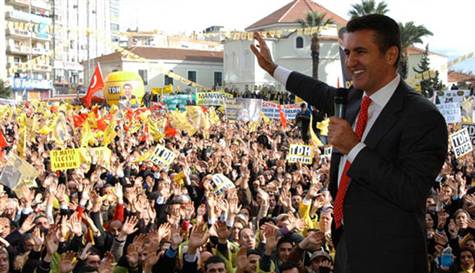
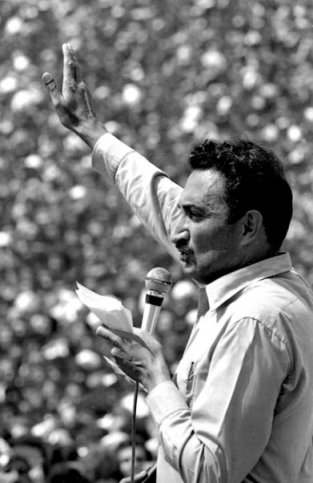
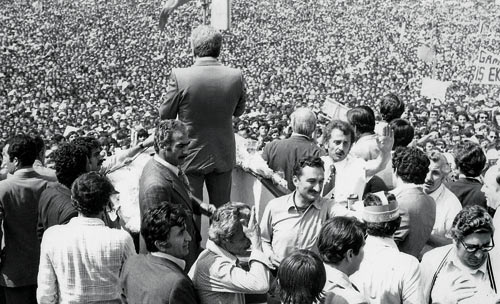
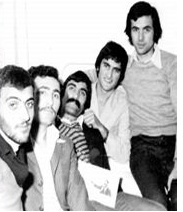
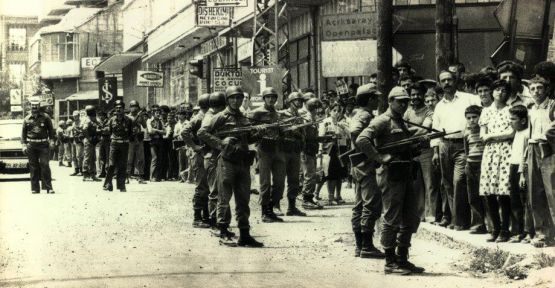
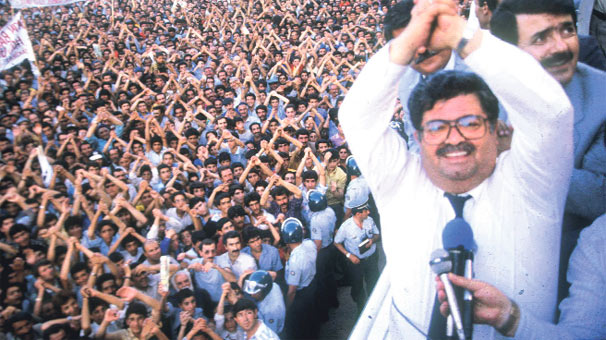
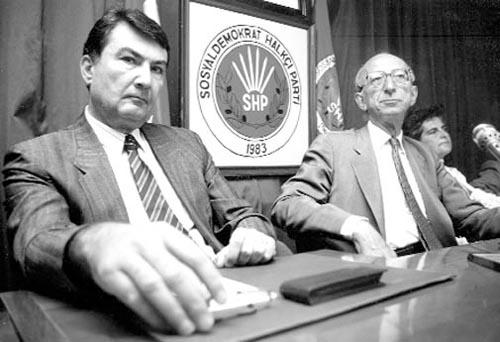
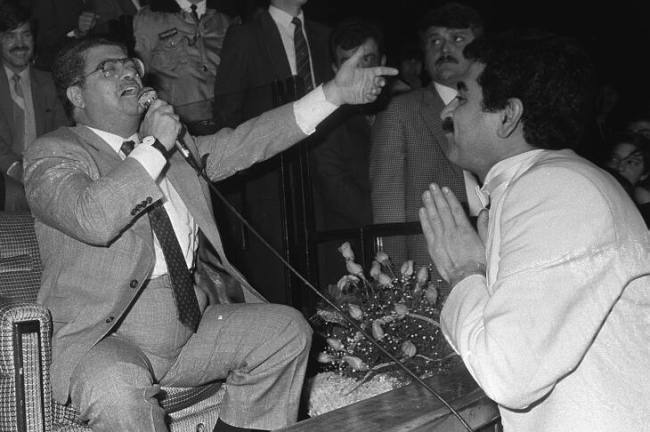
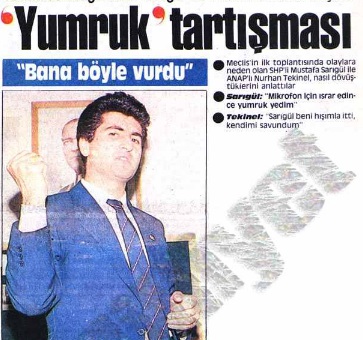
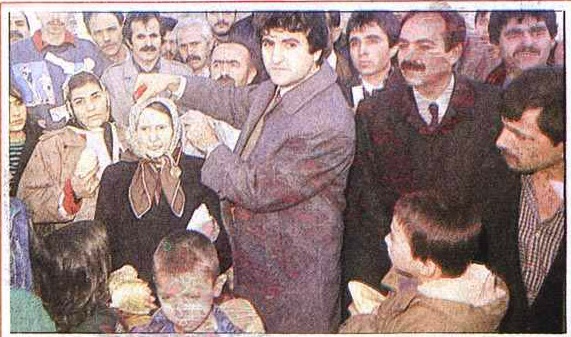
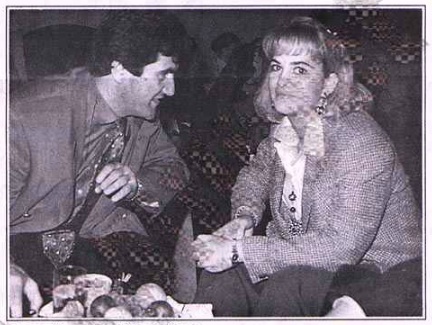
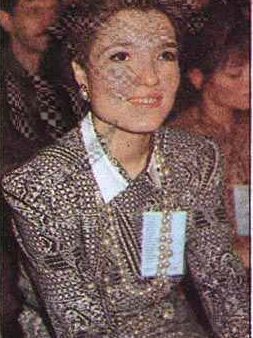
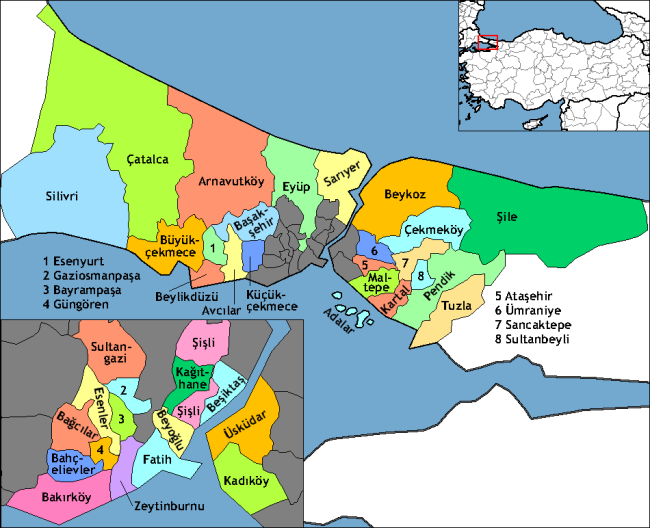
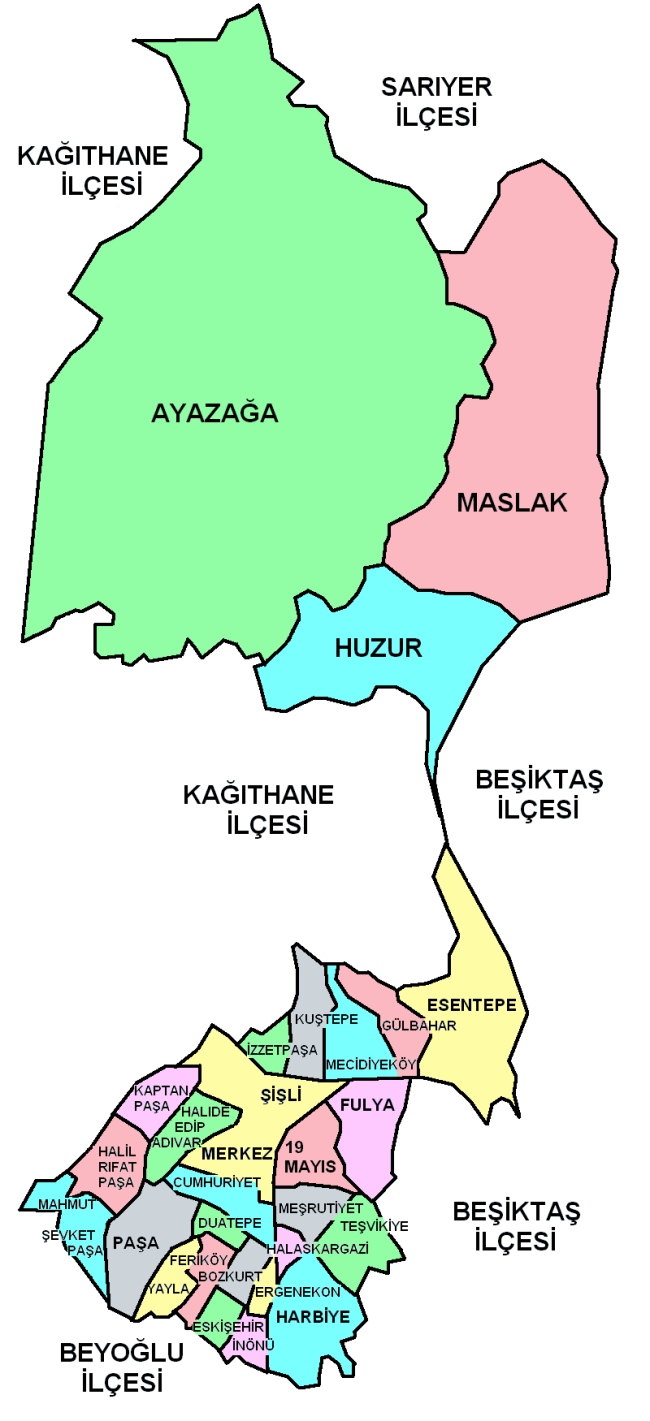
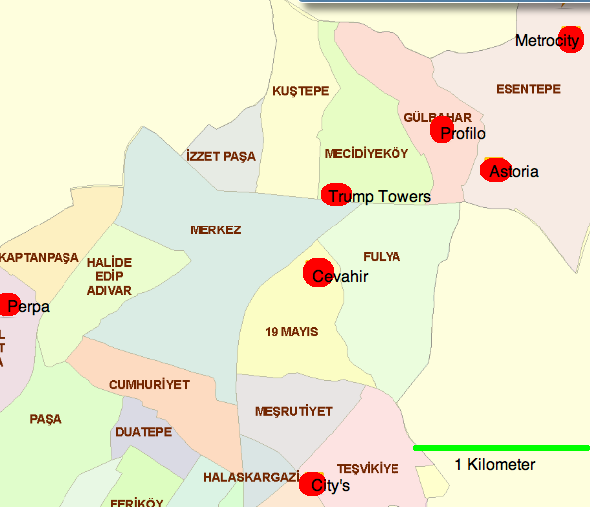
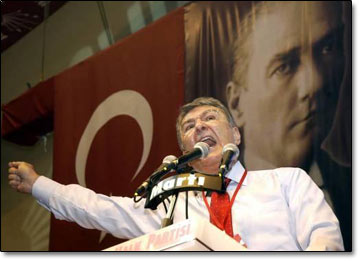
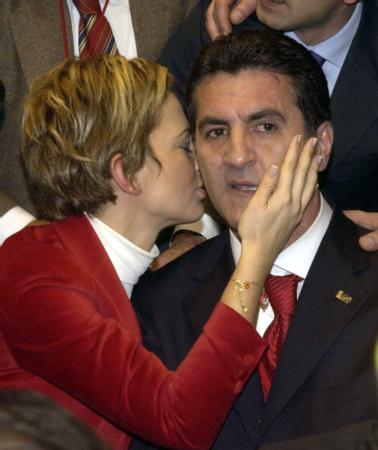
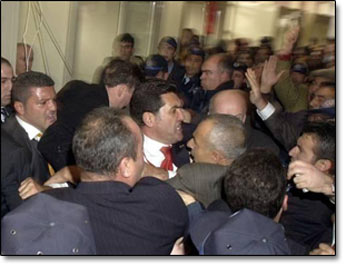
Reblogged this on Toplumsal Gercekler and commented:
Add your thoughts here… (optional)